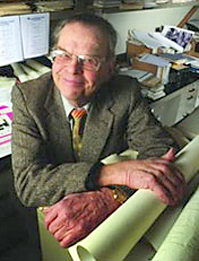Harold H. Harvey Graduate Scholarship
The Harold H. Harvey Graduate Scholarship was established by the friends, students, and colleagues of Professor Harold Harvey. It is awarded to a graduate student in the Department of Ecology and Evolutionary Biology studying freshwater fishes, freshwater fisheries, and/or freshwater ecology. Academic merit and financial need will be considered.
Harold H. Harvey

Harold Harvey was born in Winnipeg, worked on provincial fisheries surveys as an undergraduate and earned his M.Sc. under the supervision of cestode experts, Robert A. Wardle and James A. McLeod. Doctoral research at the University of British Columbia on sockeye salmon was supervised by William Hoar and Peter Larkin under the sponsorship of the International Pacific Salmon Fisheries Commission. Harold took leave as Director, Cultus Lake Laboratory, to do a post-doctoral year with Professor Fred Fry at U of T. This quickly morphed into a lifetime teaching position, interrupted only by sabbatical studies in Australia and Norway. Harold’s arrival in Toronto coincided with an interest by Ontario Ministry of Natural Resources in Pacific salmonids and in regional limnology/fisheries. The result was a simultaneous series of studies in the lakes of Manitoulin Island and the LaCloche Mountains, north shore Georgian Bay. The fishes in the latter group of lakes were undergoing rapid reduction in kinds and abundances of species. The cause of this was identified as acidification caused by long-range transport of atmospheric sulphur dioxide/trioxide/sulphuric acid. The Manitoulin lakes yielded interesting patterns of species occurrences in relation of physical, chemical, and biological factors and led to geographic comparisons with survey results from lakes of the Bruce Peninsula, the Wawa region, plus lakes in Muskoka, Haliburton and Parry Sound.
Acidification studies were extended to using fish gills as indicators of aluminum toxicity and blood ion changes as measure of physiological stress. Final step was relating the impact of acid snow melts and acid precipitation events to episodic fish kills. Concurrently Professor Harvey was called upon for scores of presentation, scientific, public and to politicians until a Canada – United States agreement was signed for the purpose of reducing sulphur emissions, the precursors of acid rain. This effort to identify and control the effects of acid disposition was read into Hansard, the parliamentary record. In order to minimize the interference with game fish species, the principal fish of study became the ubiquitous white sucker, resulting in a series of publications on population dynamics, contaminants, feeding and ecology.
Harold Harvey supervised 35 graduate students and published some 100 papers, many with his students. Within the zoology department, Professor Harvey served as associate Chair, Graduate Affairs, Acting Chair, and as departmental Development Officer, which was directed specifically at fundraising for undergraduate and graduate scholarships. This activity continued post-retirement, yielding some 40 endowed scholarships in the Department of Ecology and Evolutionary Biology.
Support Us
Help our efforts to educate and train the future designers of environmental sustainability.
